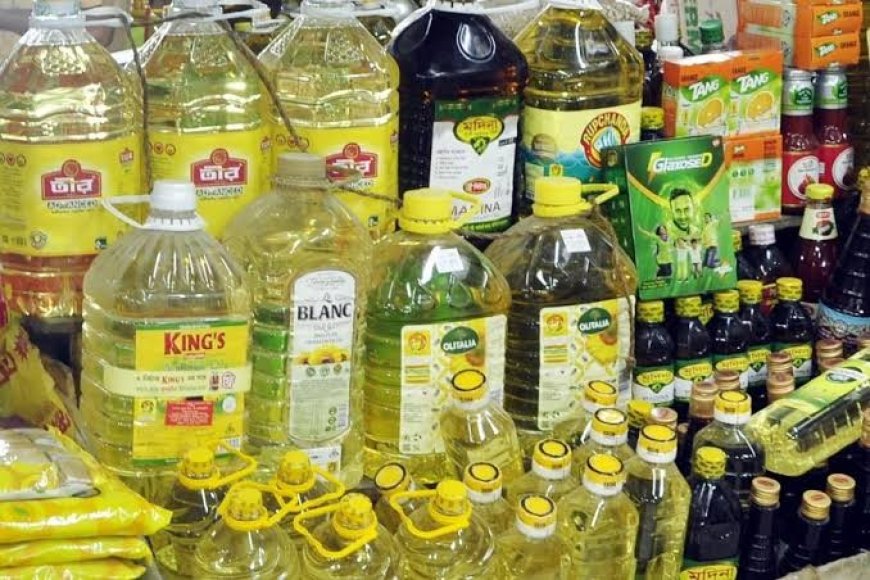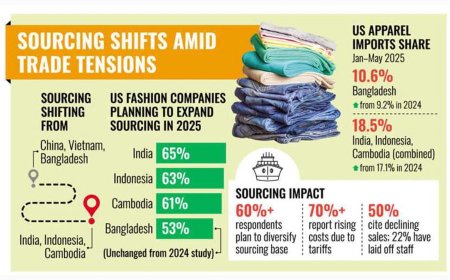A shortage of bottled soybean oil in the market drives up its price
A shortage of bottled soybean oil in the market drives up its price

Soybean Oil Shortage Drives Prices Up in Shewrapara and Beyond
Yesterday afternoon, Hasinur Rahman visited Shewrapara market in the capital to buy bottled soybean oil. After checking five grocery stores, he managed to find a two-litre bottle at just one shop. However, the price was Tk 15 higher than the label indicated.
“I was looking for a one-litre bottle of soybean oil but couldn’t find it despite visiting several shops,” Hasinur said. “I had no choice but to buy a two-litre bottle.”
The scarcity of bottled soybean oil is not limited to Shewrapara; retail markets across the capital are facing a similar situation. In rare instances where the oil is available, shopkeepers are charging Tk 10 to 15 more than the printed price. Sellers acknowledge that regular consumers are bearing the impact of this acute shortage. To attract buyers, some shops have started selling unpackaged soybean oil.
Visits to several markets and discussions with shopkeepers revealed that oil refining companies are supplying significantly less bottled soybean oil. Retailers and wholesalers say they have not been able to procure adequate supplies despite repeated requests to distributors.
Only two or three companies are currently releasing bottled soybean oil, which is far below market demand. Officials at several oil-supplying companies were contacted, but no official statements were provided. Retailers noted that one, two, and five-litre bottles of soybean oil are almost unavailable.
According to the Trading Corporation of Bangladesh (TCB), one litre of open soybean oil is selling for Tk 165-168, while open palm oil costs Tk 158-159 per litre at retail.
Government and Industry Response
The shortage of bottled soybean oil started around three weeks ago. To address this, the government reduced customs duty on edible oil imports by Tk 10-11 per kilogram. Despite the reduction, imports have not increased, and the shortage persists.
In response, the Bangladesh Trade and Tariff Commission (BTTC) held a meeting with oil refining companies on Thursday. During the meeting, traders confirmed that letters of credit (LCs) for soybean oil imports ahead of Ramadan were at typical levels. However, they stressed the need to align domestic prices with global market trends.
Following the discussion, the Tariff Commission decided to form a committee with representatives from the Institute of Cost and Management Accountants of Bangladesh (ICMAB) and the Institute of Chartered Accountants of Bangladesh (ICAB). The committee will investigate why edible oil prices have not dropped despite reduced customs duty and will submit recommendations soon.
Vegetable Prices Decline Amid Improved Supply
Meanwhile, the increased supply of winter vegetables has led to significant price reductions. Cauliflower and cabbage are now selling at Tk 40-50 each, radishes at Tk 40-50 per kg, turnips at Tk 60-70, beans at Tk 60-100, and tomatoes at Tk 130-140 per kg. Eggplants are priced at Tk 60-80, papayas at Tk 40-50, and gourds at Tk 50-60 per kg.
Vendors reported that the arrival of fresh green chilies in the market has further eased prices, with chilies selling at Tk 80-100 per kg.
However, the price of potatoes remains high as new potatoes have yet to enter the market. Old potatoes are selling for Tk 75-80 per kg, while Indian-imported new potatoes cost Tk 110-120 per kg.
What's Your Reaction?





















































































